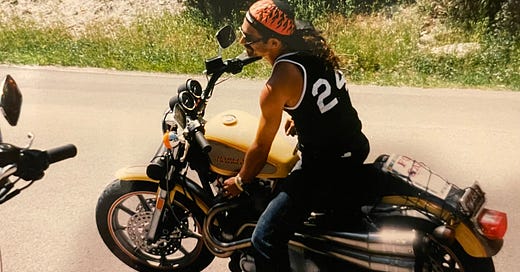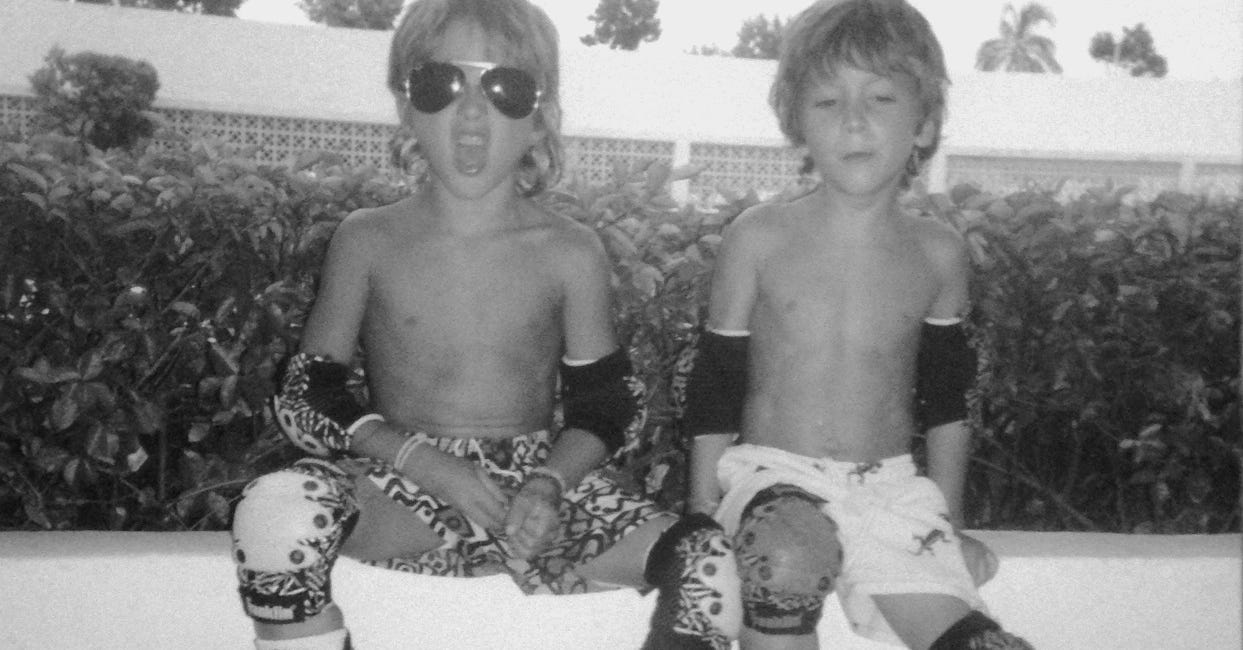One of my earliest memories of my uncle, the artist, isn’t about art at all—but that he kept a Harley Davidson motorcycle in his bedroom. Why did he do that?
“Because it was cool,” he told me. And it was cool. He is cool.
Having lived on his own terms long before I was born, my uncle, the artist, seems to approach life itself like he’s making a piece of art. With his long pony tail, wild glasses, his uncompromisingly loud style, jewelry slung around his wrists and neck, you only have to take one look at the guy to know Scott Brandt not your typical fellow.
But being different, on its own, doesn’t make a person cool.
What is cool?
In the opening pages of The Art Spirit, his seminal book on the artist’s life, Robert Henri writes: when the artist is alive in any person, whatever his kind of work may be, he becomes an inventive, searching, daring, self-expressing creature. He becomes interesting to other people.
Interesting to other people: I think that’s a good start as to why so many artists are cool. They have a way of drawing you in, a kind of questing personality that cannot be contained but must be expressed, which in turn expresses something in us, the audience. In other words, artists have this innate ability to take an idea and pursue it, and perhaps we can’t help but live vicariously through them.
Yet this speaks to a thing artists have when it might actually be something they don’t have which draws us in.
says it best in her essay Cool Self: People who are “cool” are, in the ideal state, free from something others are not.What is this thing she refers to? Convention.
My uncle would be the first to admit—and celebrate—that he has not led a conventional life. It took him a long time to settle down and even then a restless spirit kept him travelling the world, seeing new places, meeting new people, bringing back fresh fodder for his work.
Being cool is unconventional, by definition, and artists are unconventional people. It stands to reason that, since unconventional and conventional are mutually exclusive, the cooler you are the less conventional you are.
But a cool life isn’t an easy life. Giving up convention means giving up convenience—the two words share their Latin roots—and so, in this modern world where convenience is synonymous with ease, the cool person gives up the easy life exactly because they are cool.
It's not convenient to be cool, nor is it cool to be convenient. And in this way, coolness and success, in the traditionally American sense (picket fence and all that), have a strange relationship.
(Un)Conventionality
In 1983, at twenty-three years old, my uncle took a job at an interior design firm but got fired after he and the receptionist started dating. After that, he enrolled in art school and hasn’t worked for anyone else since.
Though uncompromising in his art, he also recognized the hard truth of making ends meet. As he said:
As a visual artist, putting out what you want without caring what others think doesn’t always mean it will be sellable. If you can’t make a living selling what you produce, then you’ll have to take a job doing what you would rather not. Or you live a lifestyle whereby you become your own boss.
My uncle has always loved classic and exotic cars and motorcycles (see the opening paragraph). So he built a successful business selling them. In addition to making art, he’s being doing this for 40 years.
The starving artist cliché exists for a reason; but there’s nothing inherently cool about destitution, just as there’s nothing inherently uncool about success. In the end, they exist in tension against one another, something that the English poet Robert Graves captured perfectly: There’s no money in poetry, but there’s no poetry in money, either.
This tension is a cultural phenomenon and the best question might be: wouldn’t both poetry and money be better off, if our culture cared more about art?
Building a Culture to Support Cool
In the 90s my uncle lived in both Paris and Florence.
“Both thriving cities for the arts,” he said. “Both forward-thinking cities that allowed artists to express themselves fully, and gravitational for artist for at least the last 1,500 years. If it weren't for the Medici family, the Renaissance and the world as we know it would be a very different place. They welcomed free thinkers and opposing viewpoints, in order to excel in almost every field. They were also very accepting of people. Let's face it, both Leonardo and Michelangelo were gay in a time where anywhere else in the world they would have been condemned, jailed and killed. Yet, in Florence they were allowed to shine like a beacon in spite of their sexual preference, which had nothing to do with their abilities. Unfortunately, it’s hard to do that in today’s America.”
The Medici family made their fortune in banking, but were more importantly great patrons of the arts, financing among many others: Leonardo, Michelangelo, Donatello and Raphael (yes, that’s all four of the teenage mutant ninja turtles).
Every culture goes through periods of expansion and contraction. If you care for etymology, this is baked into the very names of our dueling modern political philosophies of progressivism and conservatism: to progress is to expand, to conserve is to contract.
It should be no surprise that the present situation is one of contraction.
argues the 21st century has so far been culturally stagnant. Erik Rittenberry, who writes a great column called , calls ours an “unpoetic era.”And where are the modern-day Medicis? Of course, we all have to pay the bills but I wonder if the next Michelangelo is out there driving Ubers because rent is due and no one’s buying his works of genius shoved beside the water heater in his walk-up apartment.
The cynic in me would say no one cares about art anymore. Plenty of people have written essays about it (if you want to read them, look up Elle Griffin, but I won’t link it). Because I think that’s bullshit. People do care about art—if anything, they just don’t realize it. I could cite statistics of record-breaking concert attendance, but I’d rather share the video below:
This is hands-down my favorite thing the internet has ever produced. Look at how the people feel it! I mean, I still feel it and I’ve probably watched it fifty times. Interestingly, a bank sponsored the performance, which some people take issue with. But in our corporatocracy, what’s the difference between Sabadell and the Medici family—they were bankers, after all.
Perhaps the patrons will come. Maybe we band together and crowdsource patronage for each other—and now is when I pitch you to upgrade to a paid subscription (just kidding, the link is at the end of the article).
But the truth is nobody is going to save our culture except us. You and me. And ultimately, finding something you believe in and fighting for it is the coolest thing a person can do, artist or not.
Life as Art
My uncle has always been fond of the Alexander Hamilton quote: If you don’t stand for something, you’ll fall for anything.
We might not all identify as artists, but the thing that makes artists cool—coming up with ideas and acting on them, holding enough curiosity to question the way things are, how they could be better, more beautiful—this is within us all. And, ironically, that makes us artists.
My uncle, the artist, is cool not so much because he makes art, but that he is art. Some people are like that. I’ve referenced before the suffragette Gertrude Nelson Andrews who wrote: “A man at eighty should be a masterpiece.”
Well, couple that with Leonardo Da Vinci who said: Art is never finished, only abandoned. And all I can say is what is life but a work of art that is never finished?
Your art is your art, even if it’s only living life the best you can. But it’s never too late to be cool.
-Martin
If you liked this one, here’s another you might like . . .
Aging Out
A few years ago, as he approached ninety, I asked my grandfather how old he felt and without hesitation he said, “same as I did in high school.” This is a man married for sixty-five years with kids, grandkids, great-grandkids, not to mention countless tales of (mis)adventure traveling the world for both business and pleasure—and, yet, he still feels eig…














Wonderful! I look forward to each of your stories. Here’s to Uncle Scott!
"And where are the modern-day Medicis? Of course, we all have to pay the bills but I wonder if the next Michelangelo is out there driving Ubers because rent is due and no one’s buying his works of genius shoved beside the water heater in his walk-up apartment." The next literary Michelangelo might be right here on Substack, but lack of visibility shoves their genius behind the proverbial water heater!